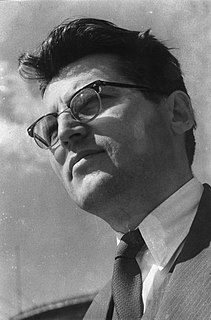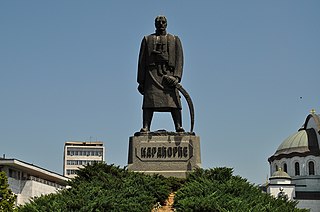Related Research Articles

Yugoslavia was a country in Southeast Europe and Central Europe for most of the 20th century. It came into existence after World War I in 1918 under the name of the Kingdom of Serbs, Croats and Slovenes by the merger of the provisional State of Slovenes, Croats and Serbs with the Kingdom of Serbia, and constituted the first union of the South Slavic people as a sovereign state, following centuries in which the region had been part of the Ottoman Empire and Austria-Hungary. Peter I of Serbia was its first sovereign. The kingdom gained international recognition on 13 July 1922 at the Conference of Ambassadors in Paris. The official name of the state was changed to Kingdom of Yugoslavia on 3 October 1929.

The term Greater Serbia or Great Serbia describes the Serbian nationalist and irredentist ideology of the creation of a Serb state which would incorporate all regions of traditional significance to Serbs, a South Slavic ethnic group, including regions outside modern-day Serbia that are partly populated by Serbs. The initial movement's main ideology (Pan-Serbism) was to unite all Serbs into one state, claiming, depending on the version, different areas of many surrounding countries.

Greater Croatia is a term applied to certain currents within Croatian nationalism. In one sense, it refers to the territorial scope of the Croatian people, emphasising the ethnicity of those Croats living outside Croatia. In the political sense, though, the term refers to an irredentist belief in the equivalence between the territorial scope of the Croatian people and that of the Croatian state.
Miodrag "Mića" Popović was a Serbian painter, experimental filmmaker and one of the major figures of the Yugoslav Black Wave.

Dobrica Ćosić was a Yugoslav and Serbian politician, writer, and political theorist.
The Memorandum of the Serbian Academy of Sciences and Arts, known simply as the SANU Memorandum, was a draft document produced by a 16-member committee of the Serbian Academy of Sciences and Arts (SANU) from 1985 to 1986.

Ante Starčević was a Croatian politician and writer. His policies centered around Croatian state law, the integrity of Croatian lands, and the right of his people to self-determination. As an important member of the Croatian parliament and the founder of the Party of Rights he has laid the foundations for Croatian nationalism. He has been referred to as Father of the Nation due to his campaign for the rights of Croats within Austria-Hungary and his propagation of a Croatian state in a time where many politicians sought unification with other South Slavs.

Serbian nationalism asserts that Serbs are a nation and promotes the cultural and political unity of Serbs. It is an ethnic nationalism, originally arising in the context of the general rise of nationalism in the Balkans under Ottoman rule, under the influence of Serbian linguist Vuk Stefanović Karadžić and Serbian statesman Ilija Garašanin. Serbian nationalism was an important factor during the Balkan Wars which contributed to the decline of the Ottoman Empire, during and after World War I when it contributed to the dissolution of the Austro-Hungarian Empire, and again during the breakup of Yugoslavia and the Yugoslav Wars of the 1990s.

Anti-Serb sentiment or Serbophobia is a generally negative view of Serbs as an ethnic group. Historically it has been a basis for the persecution of ethnic Serbs.

The Republic of Serbia was a constituent state of the Federal Republic of Yugoslavia between 1992 and 2003 and the State Union of Serbia and Montenegro from 2003 to 2006. With Montenegro's secession from the union with Serbia in 2006, both became sovereign states in their own right for the first time in nearly 88 years.

Branko Pešić was a Serbian politician in SFR Yugoslavia.

Yugoslavism, Yugoslavdom, or Yugoslav nationalism is an ideology supporting the notion that the South Slavs, namely the Bosniaks, Croats, Macedonians, Montenegrins, Serbs and Slovenes, but also Bulgarians, belong to a single Yugoslav nation separated by diverging historical circumstances, forms of speech, and religious divides. During the interwar period, Yugoslavism became predominant, and then official ideology of the Kingdom of Yugoslavia. There were two major forms of Yugoslavism in the period: the regime favoured integral Yugoslavism promoting unitarism, centralisation, and unification of the country's ethnic groups into a single Yugoslav nation, by coercion if necessary. The approach was also applied to languages spoken in the Kingdom. The main alternative was federalist Yugoslavism which advocated the autonomy of the historical lands in the form of a federation and gradual unification without outside pressure. Both agreed on the concept of National Oneness developed as an expression of the strategic alliance of South Slavs in Austria-Hungary in the early 20th century. The concept was meant as a notion that the South Slavs belong to a single "race", were of "one blood", and had shared language. It was considered neutral regarding the choice of centralism or federalism.

Rankovićism refers to a political ideology prevalent in the Socialist Federal Republic of Yugoslavia based on the political views of the Serbian communist official and former Yugoslav Partisan leader Aleksandar Ranković.
From August 1990 to November 1991, during the breakup of Yugoslavia, several Serb Autonomous Regions, or Districts were proclaimed in the Yugoslav republics of SR Croatia and SR Bosnia and Herzegovina in light of the possible secession of the republics from the Socialist Federal Republic of Yugoslavia. These were autonomous Serb-inhabited entities that subsequently united in their respective republic to form the Republic of Serbian Krajina in Croatia and the Republika Srpska in Bosnia and Herzegovina.

Montenegrin nationalism is the nationalism that asserts that Montenegrins are a nation and promotes the cultural unity of Montenegrins.

Dragomir "Dragiša" Vasić was a Serbian lawyer, writer and publicist who became one of the chief Chetnik ideologues during World War II. He finished law school in Belgrade and fought with the Serbian Army during the Balkan Wars and World War I. During the interwar period, he worked as a lawyer and represented a number of communist defendants. He was a member of the Serbian Academy of Sciences and Arts and became a correspondent at the Academy of Fine Arts on 12 February 1934. In 1936, he joined the Serbian Cultural Club and later became its vice-president. He is reported to have developed connections with Soviet intelligence services during this time.

Darko Hudelist is a Croatian journalist, non-fiction writer and researcher of contemporary history.
The Serbian Literary Herald was a Belgrade-based literary journal published in the first half of the 20th century. It was founded in February 1901, following the merger of the journals "Artwork" (Delo) and "Serbian Review". The Herald was the most influential Serbian literary journal of its time. Most influential Serbian writers had their works published in the journal, which also printed literary, theatrical and cinematic reviews. It went on hiatus for the duration of World War I but resumed publishing once peace was restored. It continued publishing issues throughout the German occupation of Serbia during World War II. Once the occupation ended, the Herald – which had never been a propagator of left-wing views – came to be viewed with suspicion by Yugoslavia's new communist authorities. In 1945–46, all issues published by the Herald during the German occupation were destroyed by the communists.
The Serbian Question refers to several periods in Serbian history and diplomatic history.
Bora Ćosić is a Serbian, Croatian and Yugoslav novelist, essayist, translator, public intellectual, and dissident. He wrote about 50 books, as well as several theater plays, which were played with great success in the Belgrade Atelje 212. For the novel The Role of My Family in the World Revolution, he received the NIN Award for Novel of the Year in 1970. Ćosić strongly denounced the rise of Serbian nationalism in the 1990s and the politics of Slobodan Milošević. Born in 1932 in Zagreb, he lived in Belgrade from 1937 to 1992, when he moved to Berlin.
References
- 1 2 3 "Nick Miller". works.bepress.com. Boise State University. Archived from the original on 11 May 2015.
- ↑ Miller, Nicholas J. (1998). "About". Between Nation and State: Serbian Politics in Croatia Before the First World War. University of Pittsburgh Press. ISBN 978-0-82297-722-3.
- ↑ Dawisha, Karen; Parrott, Bruce (1997). Politics, Power and the Struggle for Democracy in South-East Europe. Cambridge University Press. p. xvi. ISBN 978-0-52159-733-3.
- ↑ Miller, Nicholas J. (2007). "Backcover". The Nonconformists: Culture, Politics, and Nationalism in a Serbian Intellectual Circle, 1944-1991. Central European University Press. ISBN 978-9-63977-613-5.